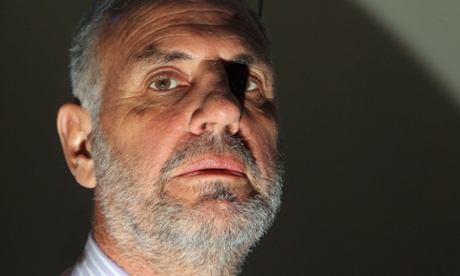Asked if he makes a medical judgment of people who want to end their life, Nitschke says, ‘no, I wouldn’t accept that at all’

Medical training means nothing when assessing a person who says they want to kill themselves, euthanasia advocate Philip Nitschke has told a tribunal hearing his appeal against his suspension as a doctor.
Giving unexpected testimony to the tribunal in Darwin on Wednesday, Nitschke said he was often approached by people expressing a desire to end their lives but that they were approaching him as a euthanasia advocate, not a doctor.
Lisa Chapman, acting for the medical board, asked Nitschke if he believed he was making a medical judgment when he spoke to people.
“No, I wouldn’t accept that at all, it’s the same assessment we all make in encounters with people,” he said. “I’m a doctor by training, that doesn’t mean I divest myself of my human qualities.”
Nitschke is appealing the suspension of his medical licence by the Medical Board of Australia in July following allegations aired by the ABC program 730 that he counselled a 45-year-old Perth man, Nigel Brayley, who later took his own life with a euthanasia drug.
Brayley’s final note revealed the reason for his suicide was “the ongoing harassment of the WA police, crimes squad and … one particular detective” after an investigation into the death of Brayley’s wife became a murder inquiry.
The medical board claims Nitschke had a duty to intervene when Brayley told him of his intentions.
But Nitschke’s lawyers have maintained that because their client was not Brayley’s doctor and did not counsel him, the suspension was instead driven by the board’s distaste for Nitschke’s views.
Nitschke, who is a director of the euthanasia advocacy group Exit International, disputed the suggestion that his medical training still informed his skills in making an assessment of an individual.
“You’re effectively saying ‘you have medical training therefore you’re doing a medical assessment’,” he replied. “It’s just me, who happens to have medical training.
“If a person comes up with some florid psychosis in the street you know this is not a [usual] encounter. If they then say they’re thinking of suiciding there’s alarm bells everywhere.”
He said that would be apparent to anyone, doctor or not.
Nitschke also criticised what he saw as a broadening definition of psychiatric illnesses in medicine, and said there was “no evidence” of a definitive connection between suicidal feelings and an illness.
He said the presentation of elements of a disease – such as short term symptoms of depression – are no reason to limit a person running their own lives or even organising their own death.
“Depression can be a serious mental illness and of course it can lead to a person being of unsound mind,” he said. “[But] we’re talking here about degrees of depression. We need to be careful about defining well people as sick.”
The most common reason people gave to Nitschke for wanting to end their lives was a terminal illness, he said, but sometimes people gave “social reasons” such as financial difficulties or being lonely or “tired of life”. Whether he saw these as “rational” reasons for suicide depended on the context of the conversation.
“If I formed the opinion this person would fit the criteria of being rational, I would leave it to them to decide if they would proceed with this lawful act of ending their life,” he said. “I don’t just walk away when they say they’re going to die, to end their life … It’s not a flippant exchange, but it’s not in any way a doctor-patient involvement,” he said.
Chapman had earlier told the tribunal the community has “high expectations” of the medical profession, and suggested Nitschke’s lack of intervention with Brayley did not meet them.
But Nitschke maintained that Brayley presented as a person who was “considered” and of sound mind in his decision to end his life.
“He might have been a criminal, but he wasn’t sick,” said Nitschke, referring to the suspicions around Brayley’s involvement in his wife’s death.
The hearing continues.
